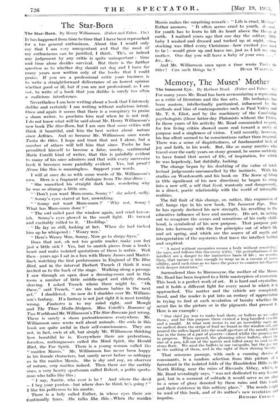Memory , The Muses' Mother The Innocent Eye. By Herbert Read.
(Faber and Faber. Gs.) For many years Mr. Read has been accumulating a reputation as a critic of literature and the fine arts. His technique has
been austere, intellectually puritanical, influenced by the methods and bias of contemporaries such as Paul Valero and Mr. T. S. Eliot, and by the machinery of the Cambridge psychologists (those latter-day Platonists without the Plato).
In those years of his activity Mr. Read commanded respect, for few living critics showed more zeal toward a unity of purpose and a singleness of vision. Until recently, however, his fine effort seemed to be conscientious rather than inspired. There was a sense of dispiritedness, of fundamental lack of joy and faith, in hiS work. But, like so many ascetics who travel over the early years on stony ground, he seems suddenly to have found that secret of life, of inspiration, for which he was hopelessly, but dutifully, looking.
The change began by his doubting of the value of intel- lectual judgements uncounselled by the instincts. With his studies on Wordsworth and his book on The Sense of Glory (a title significant of his new direction) he began to creep into a new self, a self that lived, wantonly and dangerously, in a direct, poetic relationship with the world of intangible realities.
The full fruit of this change, or, rather, this expansion of self, hangs ripe in his new hook, The. Innocent Eye. Here he has openly declared his new strength, his revelling in the educative influence of love and memory. His act, in setting out to recapture the scenes and sensations of his early child- hood, is symbolical of his new purpose. That purpose puts him into harmony with the few principles out of which life and art spring, and which are the source of all myth and interpretation of the mysteries that leave the intellect baffled and sceptical.- •
" A mind without memories means a body without sensibility,' (he says, and follows this discovery with), the perturbations of the intellect are a danger to the instinctive basis of life ; no wonder, then, that nature is wise enough to wrap us in a cocoon of insen- sibility, until such time as we have the power to counter intelligence with deeper intuitions.' "
Surrendered thus to Mnemosyne, the mother of the Muses, Mr. Read has been inspired to a little masterpiece of evocation. This book is a perfect work of art. It is hard and crystalline, and it holds a different light for every mood in which it is approached. The matter and the vehicle are completely fused, and the reader is put into an ecstasy of appreciation in trying to find at each revelation of beauty whether the secret lies in the picture or in the pigments that present it.
Here is an example :
" Our chief joy was to make lead shoti, or bullets as we culled them ; and for this purpose there existed a long-handled crucible and a mould. At what now seems to me an incredibly early age we melted down the-strips of lead we found in the window-sill, and poured the sullen liquid into the small aperture of the mould, which was in the form of a pair of pincers—closed whilst the pouring we in progress. When opened, the gleaming silver bullets, about the size of a pea, fell out of the .matrix and rolled away to cool on the stone floor. We used the bullets in our catapults, but the joy We!, in the making of them, and-in the sight of their shining beauty.
That sensuous passage, with such a cunning device of consonants, is a random selection from this picture of a farmstead in the isolated folds of the Hambledon Hills in the North Riding, near the ruins of Rievaulx Abbey, which, as
Mr. Read revealingly says, " was not dedicated to any knows god, but in a moment of solitude it would serve as an altar to a sense of glory denoted 'by these ruins and this tomb• and their existence in this solitary place." The words might be used 'of this bail:, and of its Mithor's new revelation and














































 Previous page
Previous page